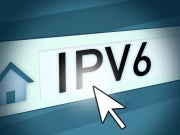ebenzunlimited
Moderator

Researchers saw the writing on the wall, and could predict based on the rate of growth for Internet use and IP-connected devices that IPv4 couldn?t last forever. IPv6 has been in development for nearly two decades. Now, the next generation protocol is ready to replace IPv4 and assume its place as the backbone of the Internet.
So, what exactly is IPv6 and what does it mean to you?
Why is IPv6 necessary?
The most obvious answer is that IPv4 is out of IP addresses. IPv4 has only 4.3 billion addresses, and with PCs, smartphones, tablets, gaming systems, and just about everything else connecting to the Internet we?ve tapped the system dry. IPv6 uses 128-bit addresses and is capable of 340 undecillion addresses. That is 340 times 10 to the 36th power, or 340 trillion trillion trillion possible IP addresses.
How is IPv6 different / better than IPv4?
Expanding the pool of IP addresses (putting it mildly) yields some additional benefits as well. Because of the dearth of IPv4 addresses much of the Internet relies on NAT (Network Address Translation). With IPv6 every device can literally have its own unique public IP address.
Most home and small business users really only have one IP address on the Internet--the one assigned to the router that connects them to their ISP. The router in turn issues IP addresses internally to the devices that attach to it, but must constantly keep track of which traffic belongs to which device, and translate the IP address from the internal one to the public one in order to facilitate communications with the Internet.
Tri Nguyen, a representative of ZyXEL, explains, ?All devices will be accessible on the public network, making it easier for people to manage things like home automation, file sharing, online gaming, peer-to-peer programs and other applications without complex settings on their router.?
Nguyen adds that there are also features of the IPv6 protocol itself that make it more secure than IPv4. The integrity and authenticity of each IPv6 packet is ensured through encryption, and techniques aimed at preventing packet spoofing. IPv6 is much better than IPv4 at making sure Internet traffic gets to the correct destination without being intercepted.
Will my IPv4 devices still work / connect to the Internet?
In a word, yes. IPv4 and IPv6 are not directly compatible, but researchers realized that you can?t simply flip a switch and turn off IPv4 while most of the world still depends on it. IPv6 devices are built using a process called dual stack that allows IPv6 and IPv4 to run simultaneously alongside each other.
Nguyen says, ?IPv4 support will not be dropped any time soon, and legacy IPv4 hardware should continue to function well into the future.?
Is it urgent to switch to IPv6?
The fact is the vast majority of the devices connected to the Internet today are not compatible with IPv6, and the dual stack technology ensures that legacy IPv4 devices will still work for the foreseeable future. So, no--it?s not urgent to switch to IPv6.
That said, IPv6 should still be on your radar. ZyXEL?s Nguyen cautions, however, that in regions that run out of IPv4 addresses completely, new hosts being connected to the Internet could be forced to rely on IPv6 addresses.
SMBs need to be aware that IPv6 is here, and make sure that any future PC, mobile device, network infrastructure, or other IT purchases support the next generation protocol. IPv4 should still be alive and kicking long enough for most organizations to transition to IPv6 by attrition over time.
What are the top three reasons an SMB should care or make the switch to IPv6?
1. Inevitability
The simple fact of the matter is that IPv6 will soon be the only option for adding new devices or hosts on the Internet. SMBs should be transitioning to IPv6 so they?re prepared when the inevitable day comes that IPv4 is no longer supported. Embracing IPv6 sooner rather than later will allow SMBs to operate with the peace of mind that the extinction of IPv4 won?t impact their businesses.
2. Efficiency
Nguyen explains, ?IPv6 simplifies and speeds up data transmission by handling packets more efficiently, and removing the need to check packet integrity. This frees valuable router time that can be better-spent moving data.?
With enough unique IP addresses to go around (and then some), organizations won?t have to rely on NAT to connect to the Internet. IPv6 eliminates most of the address conflict issues common under IPv4, and enables more streamlined connections and communication for devices
3. Security
When networking gurus and researchers developed IPv4 security hadn?t really crossed their minds. IPv4 was never meant to be secure.
IPv6 has been built from the ground up with security in mind. Many of the security features that have been duct-taped after the fact onto IPv4 as optional features are integrated into IPv6 as default requirements. IPv6 encrypts traffic and checks packet integrity to provide VPN-like protection for standard Internet traffic.